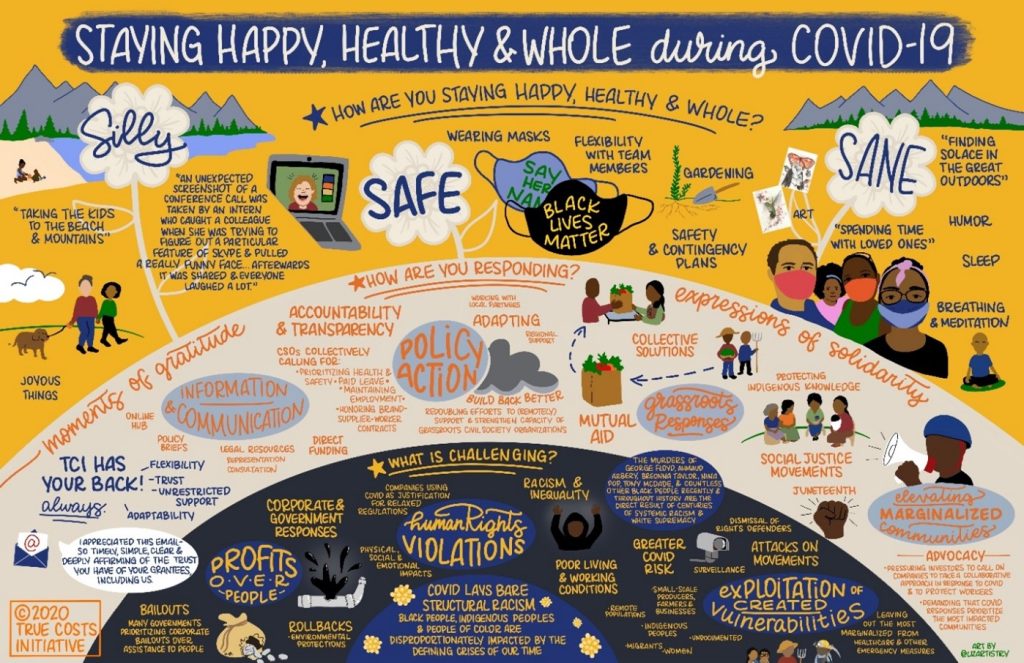One day, I nodded absentmindedly at a comment my four-year old made. She looked at me and said: ‘Mama, you aren’t listening to me with your listening ears!’ I was simultaneously taken aback and humbled. This was undoubtedly something she heard from one of her teachers at school. The prescience of this message and its tiny messenger were unexpected, but I appreciated the lesson. We don’t do enough listening with our listening ears in life, and we certainly don’t do enough of it in philanthropy.
Instead, we listen only so we can comment, critique, or champion positions or ‘expertise’ that we believe we possess. But we as funders need to take a page from the book of toddlers and listen with our listening ears. After all, isn’t it their future that we are all working so hard to protect?
On occasion, grantee partners have told us that they vacillate between dread and anxiety as funder calls approach. Some may enter calls feeling like supplicants instead of like true partners. There is the invisible push to tailor their work to what they think we funders want to hear.
Recognizing that this power dynamic is somewhat inevitable in philanthropy, we at True Costs Initiative (TCI) have been incorporating alternative approaches to these grantee partner calls. We are still learning and adjusting our processes. However, we found three questions that have forced us to truly listen.
1. What do you want to tell us, and what didn’t we ask you that we should have?
Funders often enter grantee partner calls with a prescriptive agenda and curated approach to those interactions. We tend to be inordinately driven by what we want to know and which responses to our questions will ‘justify’ our investment in their work. But what if instead, our starting point was what grantee partners actually want to tell us, not what we want to hear? It could change the paradigm, and it would create much more space for unvarnished conversations, creativity, and openness to investing in ‘riskier’ initiatives.
We never leave a call without asking partners what it is that we have missed. Undoubtedly, there are things that we should have asked, should have listened better to, or neglected to see because of our ‘philanthropic blinders.’ Initially, our question caught several of our grantee partners off guard. Some of them told us that no funder had ever asked them such a question. Their responses to this question are sometimes the most illustrative of their work and provide the impetus for creative and boundary-pushing collaborations and initiatives.
2. Who do you need to succeed in order to do your work?
In the article Five Ways To Become A Better Climate Funder, Nani Reventlow highlights how important it is to ask partners, ‘Who needs to succeed in order for the work you are focusing on to succeed?’ I love this question. Too often in philanthropy funders are hungry for the what – the banner projects, the ‘innovative’ solutions, or the groundbreaking litigation – but we ignore the who. Who are the indispensable partners of our partners, who provides them invaluable insight and expertise behind the scenes, for decades and without remuneration?
For instance, our partner Corporate Accountability Lab (CAL) reached out to us for direct support to their local partner in Côte d’Ivoire. CAL had described this local partner’s cutting-edge work on government and corporate accountability. Given how significant this local partner’s work is to CAL, TCI was moved to fill a funding gap when CAL’s local partner happened to lose funding from a multilateral organization. If we are to fund well and responsibly, we must listen to understand the complete ecosystem in which our partners operate, to know who the indispensable partners of our partners are, and then we should support them too.
3. How are you staying happy, healthy, and whole?
As a team, we started asking this question in the first years of the Covid-19 pandemic and we haven’t stopped. We don’t ask this question to be cute. We ask it to be kind. That is what you would expect of a partner of any kind. This question is also very much aligned with our organization’s ethos of relationship-first philanthropy. Regardless of the specific question you choose to ask, inquiring about and understanding the health, wellness, and the sustainability of your partners’ work is critical to true partnership. It should be a permanent fixture in funder-partner interactions, not something funders do only during ‘peak-Covid’ days.
We offer these examples not because there is any one way to engage on a grantee partner call. Instead, we offer these up because they have helped us build and maintain relationships with our grantee partners, learn from them and unlearn the things we needed to unlearn.
None of this means that philanthropy should necessarily eschew calls with grantee partners. If framed with intentionality and an eye to true partnership, they can be an opportunity for bilateral learning and sharing. That said, philanthropy as a field must continue to interrogate the relevance, utility, and framing of these interactions.
Our grantee partners are the experts. We are only worthy of those grantee partnerships when we make space for partners to tell us what they want to tell us and when we listen – with our listening ears.
Conniel Malek is the Executive Director of True Costs Initiative.







Comments (0)